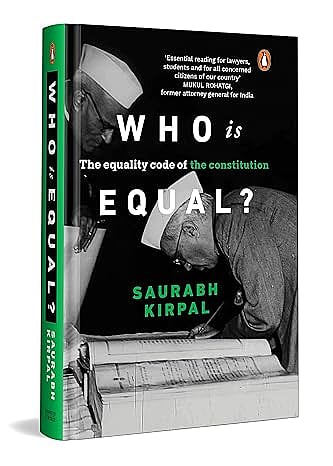All Are Equal?

One of the most radical ideas in the Indian Constitution is the notion that everyone is equal before the law and the law must protect everyone equally. In a country where “graded inequality”—elevation for some and degradation for others, as BR Ambedkar put it—is the norm, the idea of equality as a constitutional guarantee is a break from the past. Article 14 of the Constitution is one of the simplest Articles in an otherwise dense, lawyerly document but those twenty-four words contain rich and complex meanings that seventy-five years later are still being understood. The Constituent Assembly knew that these twenty-four words wouldn’t be enough—Articles 15, 16, 17 and 18 flesh out this notion of equality by throwing open public places to all, allowing for measures to promote access to education and government jobs to excluded communities, abolishing untouchability and titles.
But the idea of equality is not an uncontested idea.
This is where Saurabh Kirpal’s book Who is Equal comes in—by giving us a good overview of how this idea of equality has been understood and interpreted in courts in a number of different contexts, over the last seventy-five years. There are vastly different notions of what equality is and what the role of law in ensuring equality should be. A stable, rule of law society will allow for these competing ideas to be contested in the realm of politics and in court. The rule of law itself is necessary for any idea of equality to be meaningful—completely arbitrary rule is not fair in any sense of the word (no matter what the MCU’s Thanos would have you believe!).
AIming High
20 Feb 2026 - Vol 04 | Issue 59
India joins the Artificial Intelligence revolution with gusto
Of course, the judiciary is not the only platform for competing ideas of equality have clashed, but Kirpal’s book does a good job of laying out the development of the law related to equality. The book covers five broad areas relating to equality—education, employment, business, democracy and marriage, briefly tracing the evolution of the law in each of these areas.
Within these five broad topics, Kirpal covers much. The book is intended to be mostly an explainer but does go into some areas of critique on the ideas of equality. Of course, the topic of equality itself is so vast that just tracking the evolution of the jurisprudence on equality in post independent India would require several volumes. Nevertheless, Kirpal does a good job of setting down the basics for many contentious issues relating to the right to equality that India is grappling with. The book touches upon how the court views reservations, the problems with the Citizenship Amendment Act, delimitation of constituencies, public sector recruitment, among other issues. However, this book is not just an explainer, and its most important contribution perhaps comes in its final chapter relating to marriage equality—specifically the lack of legal recognition for same-sex relationships in India.
Coming as it does less than a year after the judgement of the Supreme Court denying gay people a fundamental right to marry, there’s a certain poignancy to Kirpal’s book. Kirpal was one of the lawyers who argued on behalf of the petitioners in the gay marriage case. He is also an openly gay man who lives with his long-term partner—a fact weaponised by the government to deny him judgeship in the Delhi High Court though the judiciary nominated him. ‘Here you have laid out this vast edifice of equality jurisprudence’, Kripal seems to be saying, ‘one that shelters women, children, Dalits, Adivasis, businesspersons, voters, and many others— but not me.’
Even as the stated aim of the book is to explain the law on equality, it should also be read as a critique of the current state of the law on equality. The question Kirpal really asks in this book is not “Who is Equal?” but “Why am I not equal to you?”

